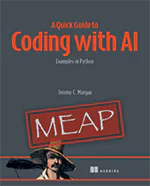Guide to Shuffling Characters in Python
In this article, we will explore the concept of shuffling characters in a string using Python. We’ll discuss the importance of shuffling and how it can be used in various applications.
Author: Jeremy Morgan
Published: December 8, 2023
I wrote a book! Check out A Quick Guide to Coding with AI.
Become a super programmer!
Learn how to use Generative AI coding tools as a force multiplier for your career.
In programming, shuffling characters in a string is a common task. It involves randomly reordering the characters in a string, creating a new sequence of characters different from the original one. There are lots of ways to shuffling in Python, including using list comprehensions and random modules.
Why Shuffle Characters?
Shuffling characters in a string can be useful in various applications, such as:
- Data Obfuscation: In some cases, it may be necessary to obfuscate data by shuffling the characters. For example, if you have a list of names that need to be anonymized, shuffling the characters can help protect the privacy of the individuals.
- Security: Shuffling can also be used as a security measure to prevent unauthorized access to sensitive information. By randomly reordering the characters in a string, it becomes more difficult for attackers to guess the original sequence.
- Data Analysis: Shuffling can be useful when analyzing text data, such as natural language processing or machine learning tasks. By shuffling the characters in a dataset, you can create a new set of samples that can help improve the performance of your algorithms.
- Code Puzzles: Code puzzles like HackerRank, Leetcode etc often ask for obscure things like scrambling characters.
How to Shuffle Characters in Python
To shuffle characters in a string using Python, we can use various techniques. Here are some examples:
Using List Comprehensions
One way to shuffle characters is by using list comprehensions. This involves creating a new list of characters and randomly selecting an element from the original list to append to the new list. We can repeat this process until all elements in the original list have been selected. Here’s an example code snippet:
import random
original_string = "hello world"
shuffled_string = [random.choice(original_string) for _ in range(len(original_string))]
new_string = ''.join(shuffled_string)
print("Shuffled string:", new_string)
Here’s the output:

You can run it multiple times and see random answers:

Using Modules
Another way to shuffle characters is by using modules such as random or numpy. These modules provide functions that can be used to generate random numbers, which can then be used to select elements from the original list. Here’s an example code snippet:
import numpy as np
original_string = "hello world"
shuffled_list = [np.random.choice(list(original_string)) for _ in range(len(original_string))]
shuffled_string = ''.join(shuffled_list)
print("Shuffled string:", shuffled_string)
Here’s the output:

This is a great method, though it does include installing Numpy. You can also use random:
import random
original_string = "hello world"
string_list = list(original_string)
random.shuffle(string_list)
shuffled_string = ''.join(string_list)
print("Shuffled string:", shuffled_string)
Here’s the output:

These are both great ways to shuffle characters.
Conclusion
Look, you may not need to shuffle characters around very often, but this is how you do it. Shuffling characters in a string is a useful technique that can be used in various applications such as data obfuscation, security, and data analysis. In Python, there are several ways to shuffle characters, including list comprehensions, modules, and in-place shuffle methods. By understanding these techniques, you can effectively shuffle characters in your text data.
I wrote a book! Check out A Quick Guide to Coding with AI.
Become a super programmer!
Learn how to use Generative AI coding tools as a force multiplier for your career.



